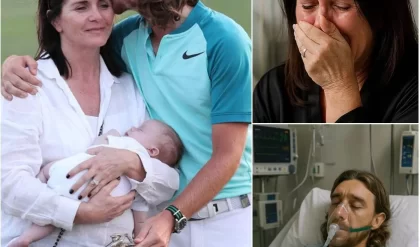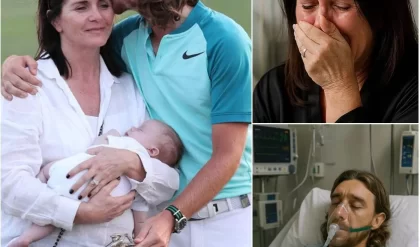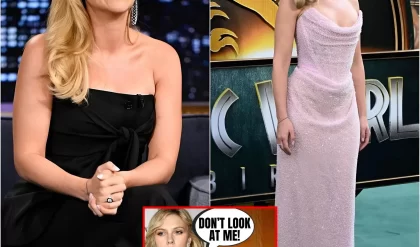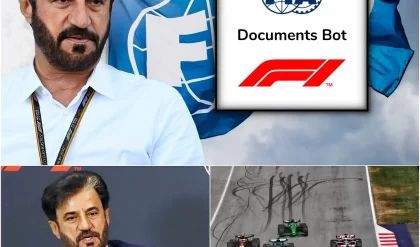🚨 Tragedy at the Scottish Grand National: Racing Mourns the Loss of Two Horses, Including Defending Champion Macdermott

The world of horse racing was plunged into mourning this weekend as the Scottish Grand National at Ayr ended in tragedy, with the deaths of two horses casting a dark shadow over what was meant to be one of the sport’s most anticipated events. Among the fatalities was Macdermott, last year’s champion, who was attempting to defend his crown. The Willie Mullins-trained star set off as a 16-1 hopeful but was pulled up sharply before the 10th fence, suffering a fatal injury that stunned fans and professionals alike.
The second casualty was The Kniphand, trained by Nigel Twiston-Davies, who fell at the second-last fence. His fall was one of several dramatic moments in a race that saw just eight of the 23 runners make it to the finish line. This latest heartbreak follows close on the heels of last weekend’s Aintree Grand National, where Celebre D’Allen died and Broadway Boy suffered a horrific fall, leaving him in recovery with a serious neck injury.
Animal welfare campaigners were quick to react, with advocacy group Animal Rising calling the race “nothing short of carnage.” The criticism adds to the growing chorus of voices questioning the safety standards in modern jump racing, especially during high-stakes events like the Grand Nationals, where the combination of large fields, demanding fences, and long distances often push both horse and jockey to their limits.

Social media exploded with grief as the news broke. Racing TV announced the fatalities in a solemn post, writing: “Heartbreaking news. We sadly lost both Macdermott & The Kniphand at Ayr. Our thoughts are with connections.” ITV Racing echoed the sentiment: “We are sad to report that after the Scottish Grand National, both MacDermott and The Kniphand have passed away following the race. Our thoughts and condolences are with the connections of both horses.”
It was a devastating blow for Willie Mullins, who not only trained the late Macdermott but also the eventual winner of the race, Captain Cody. Ridden by Harry Cobden, Captain Cody delivered a strategic, well-timed performance to cross the line first at odds of 9-1, earning a lucrative £200,000 prize. Klarc Kent followed in second, with Our Power claiming third. Rounding off the top six were Grozni, Rocky My Way, and Flash De Touzaine.
In a post-race interview with Racing TV, Cobden shared his approach to the victory, unaware at the time of the tragic outcomes for his fellow competitors. “I just wanted to get him settled early and creep him into the race,” he said. “He got into a lovely rhythm. I wanted to go wide because obviously he hasn’t had too many runs over fences. You’re better going wide getting into a rhythm than you are in the scrum of it and missing fences. It couldn’t have gone any better on the way round. When you ride for Willie Mullins, it’s easy isn’t it?”

Mullins, who endured a rollercoaster of emotions on the day, acknowledged the bittersweet nature of the win. “The two horses ran unbelievable races. Two very good jumpers and two very good stayers. There are very few races over these distances so they don’t get much time to show off how good they are. Harry gave it a very cool ride,” he said before adding, “Today we were having a dreadful day until the last. At least in the big race they came right.”
Despite the celebratory tone in some quarters for Captain Cody’s success, the mood around Ayr Racecourse remained somber. The race day was marred by multiple incidents, including jockey Harry Atkins being knocked unconscious when Snipe came down at the seventh fence. Though he was later declared stable, he was stood down for the remainder of the day. Clerk of the course Graeme Anderson confirmed, “All the jockeys are OK. Harry Atkins was stood down because he was knocked out, but everybody else is up and OK. Unfortunately, there were two equine fatalities—The Kniphand and Macdermott.”

The debate over the future of jump racing has once again taken center stage. Animal rights activists argue that these repeated incidents at marquee events highlight systemic issues within the sport, while others within the racing community emphasize the unpredictability and inherent risk of National Hunt racing. The spotlight now turns to racing authorities, who face increasing pressure to implement enhanced safety protocols, reevaluate fence structures, and perhaps limit the number of runners to prevent further tragedies.
Meanwhile, fans continue to express their heartbreak, sharing images and memories of Macdermott’s iconic 2024 win, where the bay gelding galloped home to glory with the roar of the Ayr crowd behind him. Just a year later, those same fans now pay tribute with heavy hearts. The Kniphand, too, was admired for his courage and potential, making his loss equally difficult for supporters and connections alike.
As the dust settles on a bruising day for British horse racing, the future feels uncertain. The thrill of victory was undeniable for Captain Cody and his team, but it was drowned in the sorrow of lives lost—lives that galloped with spirit and heart, only to fall tragically short.

The Scottish Grand National may have crowned a new champion, but it has also reminded the world of the fine line between triumph and tragedy in a sport steeped in tradition and risk. Whether the industry will respond with reform or reflection remains to be seen. What is certain, however, is that the memories of Macdermott and The Kniphand will live on in the hearts of those who witnessed their courage, not only as racehorses but as champions in their own right.





